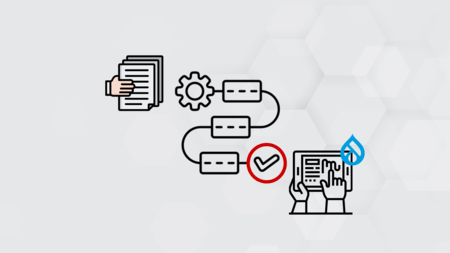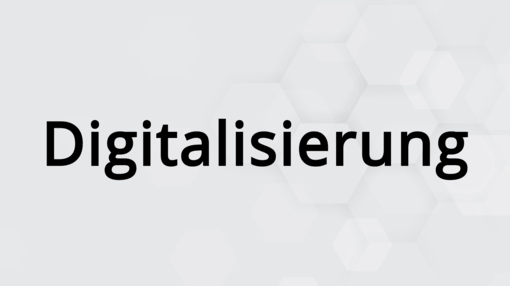
Efficient business processes form the basis for a company's success. Digitizing these processes is a crucial step in making work more efficient, reducing costs and increasing customer satisfaction. But how can companies digitize their business processes to make them not only efficient, but also flexible and future-proof?
The solution lies in versatile and customizable platforms such as Drupal. Originally known as a content management system, Drupal has long since developed into a powerful tool for the digitalization of business processes. With its flexible architecture and a large selection of modules, it offers companies the opportunity to create customized process tools that meet their exact requirements.
What advantages does Drupal bring to the digitalization of business processes? And which specific tools and modules enable efficient implementation? A look at the wide range of possible applications shows how companies can optimize their processes and make them more agile with Drupal.
More than just a CMS: Drupal as a foundation for your processes
Drupal is widely known as a content management system, but its strength lies in its modular architecture. This makes it possible to develop tailor-made solutions that not only manage content, but can also optimize entire business processes. Thanks to its open structure, Drupal is flexible enough to integrate existing systems or develop your own digital process tools. Below we describe some of the modules that Drupal already offers existing process tools.
Workflow management: process automation made easy
Approvals, order processes or internal communication chains - these processes are often repetitive and error-prone. This is where ECA (Event Condition Action) comes in, a Drupal module that automates workflows with minimal effort.
ECA is a prime example of how Drupal can digitize business processes. It makes it possible to create complex workflows without programming knowledge. Whether it's triggering automated notifications based on user actions or controlling internal approval processes, ECA offers a flexible set of rules that can be adapted to a company's individual needs.
Content workflows: Quality assurance through process automation
Creating content is one thing, publishing it is another. Drupal offers comprehensive content approval workflows that ensure that all content is checked and approved before publication.
For example, a team can create content that is automatically forwarded to an editor. After approval by a manager, the publication is controlled on schedule.
Automated communication: notifications with Rules
The Rules module is another tool for automating business processes. It can be used to set up event-based notifications. For example, emails or internal reminders can be triggered when a certain condition is met.
Example: A sales team could be automatically informed about new customer inquiries received via a web form and integrate the data directly into a CRM system
Collect and process data: Webform for dynamic forms
The Webform module goes far beyond classic contact forms. It allows the creation of dynamic forms that can collect and process data and integrate it into existing workflows. Whether for applications, customer feedback or internal data collection - the possibilities for using this module for process automation are almost unlimited.
CRM systems: Focus on customer relationships
Customer data is a valuable resource, but managing it is often complex. Drupal integrates with leading CRM solutions such as Salesforce or HubSpot to seamlessly synchronize customer information.
Alternatively, Drupal canserve as a lightweight CRM : It manages contact histories, interactions and campaigns so you can make customer data directly accessible on your platform.
HR solutions: Optimize employee processes
From applicant management to employee onboarding and training, Drupal offers the right tool for HR process digitization.
Example: A company uses Drupal to create an applicant portal that automatically sorts applications, schedules interviews and integrates feedback processes.
Revolutionizing customer service: Ticket systems with Drupal
Drupal can be used to create customized ticket systems for support and customer service. The Support module is a valuable tool here. It enables the management of customer inquiries, their categorization, prioritization and assignment to the responsible employees.
Customized digital business processes : Developing your own process tools with Drupal
With Drupal, companies can develop their own process tools that are precisely tailored to their individual requirements. Customized processes with Drupal give companies the opportunity to develop their own process tools that are precisely tailored to their specific requirements. In addition to existing process modules such as ECA or Webform, individual functions and workflows can be created to digitally map and automate complex business processes. Whether contract management, customized CRM solutions or internal approval processes - Drupal offers the flexibility and scalability to implement innovative and efficient processes.
Efficient production processes thanks to smart work instructions

For Fohhn, a specialist in professional audio solutions "Made in Germany", we have developed customized software that supports complex production processes. Instead of inflexible PDF documentation, our solution provides dynamic, audit-proof step-by-step instructions that are sent to the relevant teams in a targeted manner, with a particular highlight being the seamless link to ERP data. Parts lists and order information flow directly into the instructions - for more precise, efficient and error-free production. The result: less manual effort, more flexibility and a smart alternative to static documents.
The advantages of using customized digital process tools
- Perfect customization: Customized process tools adapt exactly to the specific requirements and processes of a company, avoiding unnecessary functions and increasing user-friendliness.
- Future-proof: Customized solutions developed with Drupal are flexibly expandable and can be easily adapted to new business requirements or technologies.
- Cost efficiency: Tailor-made tools reduce license and integration costs in the long term, as they optimally complement existing systems and eliminate redundant processes.
The future of business processes is digital - and Drupal is leading the way.
With the progress of technologies such as artificial intelligence and machine learning, it will be possible to make processes even more intelligent and efficient.
Process digitization already offers companies a wide range of opportunities to increase their efficiency and position themselves for the future. Through the targeted implementation of digital solutions, they can meet the requirements of the modern market and secure their competitiveness in the long term. Process digitization, for example, provides more:
- Transparency: Digital processes provide a clear overview of workflows and enable better traceability.
- Flexibility: Adaptations can be implemented more quickly in order to respond to new requirements.
- Customer satisfaction: Faster and more precise services increase customer satisfaction.
Your processes, your rules - digitize business processes with Drupal
Whether it's automating internal processes, optimizing customer communication or digitizing document management, Drupal-based process tools provide the basis for innovative, efficient solutions. Companies that rely on Drupal not only gain productivity, but also the flexibility to succeed in a dynamic business world.
The question is not whether you should digitize your processes - but when you want to start with Drupal.
Ready for the next step?
arocom GmbH - Stuttgart | Mail | info@arocom.de









